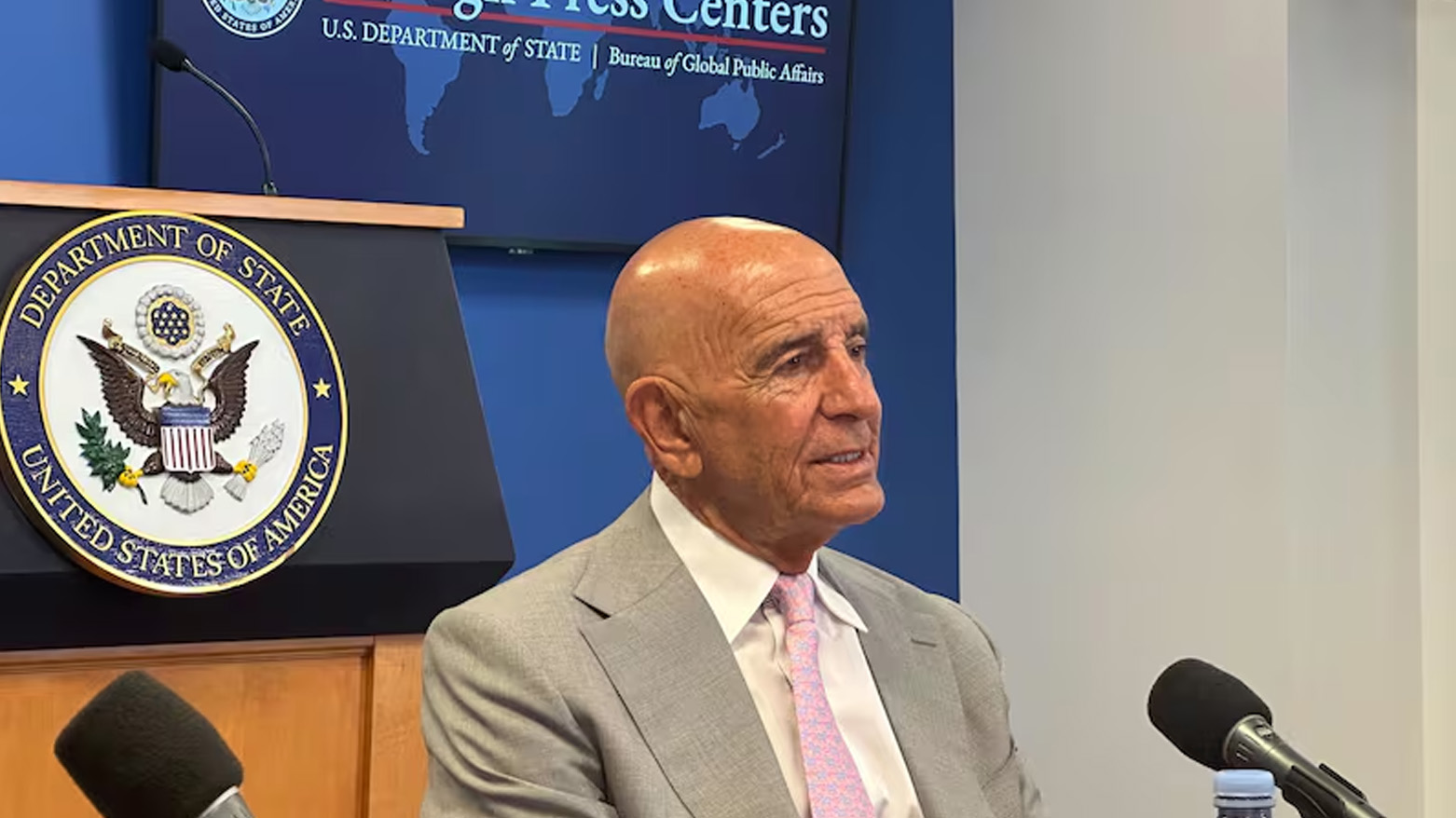U.S. Envoy Warns Lebanon Faces Existential Crisis Unless Hezbollah Disarms
U.S. envoy Tom Barrack warns Lebanon risks becoming "Syria's beach resort" unless it disarms Hezbollah, linking aid to reform. He proposes monitored weapons depots but admits Lebanon's military is too weak to act alone against Iran-backed forces.

By Ahora Qadi
ERBIL (Kurdistan24) – U.S. Special Envoy Tom Barrack issued a stark warning on Friday, stating that Lebanon faces an existential threat unless it addresses the longstanding issue of Hezbollah's weapons. The warning comes amid escalating regional tensions and renewed international efforts to restore stability in Lebanon.
Regional Pressures Mounting on Lebanon
Speaking to The National, Barrack cautioned that if Lebanon fails to act decisively, it risks being overtaken by regional powers. “You have Israel on one side, you have Iran on the other, and now you have Syria manifesting itself so quickly that if Lebanon doesn’t move, it’s going to be Bilad Al Sham again,” he said, using the historical term for Greater Syria.
Barrack noted that Syrians often refer to Lebanon as “our beach resort,” highlighting the vulnerability of the country amid competing regional interests. He emphasized that Lebanese inaction could lead to further erosion of sovereignty.
U.S. Proposal Links Aid to Disarmament and Reform
The U.S., along with Saudi Arabia and Qatar, has offered to support Lebanon if the government leads efforts to disarm Hezbollah and implement vital economic reforms. Last month, Barrack presented Lebanese officials with a comprehensive proposal: disarm Hezbollah, stabilize the economy, and in return, unlock much-needed reconstruction aid and secure a halt to Israeli military operations.
Since the U.S.-brokered ceasefire in November, Hezbollah has withdrawn most of its fighters from the Israeli border. However, Israel continues to demand the full disarmament of the Iran-backed group across Lebanese territory.
In response, Beirut submitted a seven-page document reaffirming state control over arms and pledging to dismantle Hezbollah’s weapons in southern Lebanon. Yet, the document stopped short of committing to a nationwide disarmament.
“I thought it was responsive, very responsive,” Barrack said, while acknowledging that contentious issues remain unresolved. “We have an agreement… The problem is, nobody followed it.”
Security, Sovereignty, and a Fragile Military
Barrack underscored the fragile state of Lebanon’s military, describing the Lebanese Armed Forces (LAF) as credible but drastically underfunded. “They’re using equipment that’s 60 years old,” he said, noting that LAF’s limitations have forced UN peacekeepers (UNIFIL) to fill critical gaps in border security with 10,000 troops.
Although Hezbollah has justified its arsenal by citing Israel’s continued airstrikes and occupation of disputed territories, Barrack insisted that the only sustainable solution lies in a neutral national defense.
He floated a possible mechanism for Hezbollah to surrender its heavy weapons, including rockets and drones, into monitored depots overseen by the U.S., France, Israel, and the Lebanese army. However, he stressed that the LAF currently lacks the personnel and resources to implement such a plan independently.
Concerns over Corruption and Gulf Reluctance
Efforts to mobilize Gulf funding for Lebanon’s military have been hindered by mistrust, Barrack said. “Why do the Gulf partners not want to do that? Because they’ve given so much money to Lebanon in the past that’s gone to the corrupt leaders,” he explained. “So they’re saying, ‘Yeah, we’re done.’”
He added that any international financial support must include guarantees that aid will bypass Lebanon’s entrenched political elite and avoid further corruption.
“This is the big dilemma,” Barrack remarked, highlighting the importance of bolstering the LAF to reduce Hezbollah’s military dominance and restore state authority.
Hezbollah’s Future and Civil War Fears
Asked if the U.S. might consider delisting Hezbollah from its foreign terrorist organization (FTO) designation if it disarms and becomes a political party, Barrack declined to answer directly.
Regarding Lebanese President Joseph Aoun’s reluctance to commit publicly to a disarmament timeline, Barrack suggested: “He doesn’t want to start a civil war.”
Despite the risks, he emphasized that international coordination, particularly among the U.S., Gulf nations, UNIFIL, and Lebanon’s institutions, remains critical to establishing a workable plan.
“We need to help bolster the LAF,” he concluded. “We can do it hand-in-hand with the Gulf countries, hand-in-hand with UNIFIL, as we redefine what their role is on a continued basis.”
The U.S. warning to Lebanon regarding Hezbollah’s disarmament comes on the heels of renewed international coordination to counter the group's global influence. On July 9–10, the U.S. Department of State, in partnership with the Department of Justice and Europol, convened the 14th meeting of the Law Enforcement Coordination Group (LECG), a multilateral forum aimed at disrupting Hezbollah’s terrorist and illicit networks.
Attended by representatives from around 30 countries, including from the Middle East, Europe, Africa, Asia, and the Americas, the meeting underscored growing concerns over Hezbollah’s transnational reach and its evolving fundraising efforts, particularly in regions like Africa and Latin America.
Participants assessed that despite suffering significant operational setbacks over the past year, Hezbollah remains a capable and dangerous organization, with the ability to strike globally with little warning. Discussions at the LECG also highlighted Hezbollah’s worsening financial condition, prompting fears that it may intensify criminal and fundraising activities to maintain its influence.
The session reinforced the urgency of cutting off Hezbollah’s financial lifelines and coordinating diplomatic, law enforcement, and counterterrorism efforts—a message that mirrors the Trump administration’s latest proposal to link aid for Lebanon to the group’s full disarmament and the reassertion of state authority.
